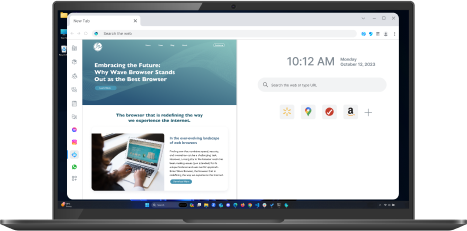Top Non-Chromium Browsers to Explore Today
Table of Contents

In a world where most browsers are based on Chromium, it can seem like your choices for a different and private browsing experience are few. But there are more non-Chromium browsers coming up that offer great options.
These browsers focus on user privacy, include unique features, and support a more varied web.
What Makes a Browser Non-Chromium?
Chromium is a browser project that Google created. It provides the base for many well-known browsers like Google Chrome, Microsoft Edge, and Opera. These Chromium browsers are fast and work well, but they can also make people worry about data collection and how much influence Google has on the internet.
Non-Chromium browsers use different engines. Examples include Mozilla's Gecko and Apple's WebKit, which focus more on user privacy. They offer unique features and help create a wider range of options on the web. When you choose a non-Chromium browser, you enjoy a browsing experience that doesn't depend only on Google's technology.
The Best Non-Chromium Browsers Available Now
If you want a browser that cares about your privacy and gives you a special browsing experience, check out these top non-Chromium browsers: Mozilla Firefox, Safari, LibreWolf, Waterfox, Mullvad Browser, and Pale Moon.
Each of these browsers has its own features and functions. They meet different needs and likes. If you care most about privacy, customization, or speed, you can find a non-Chromium browser that’s just right for you.
1. Mozilla Firefox
Mozilla Firefox is a top non-Chromium browser. It stands out because of its strong privacy features and many customization options. Firefox keeps user privacy in mind. For example, it has Enhanced Tracking Protection to block third-party trackers automatically.
Users can also change their browsing experience using different themes, add-ons, and extensions. It is a flexible browser that cares about privacy. Firefox is great for users who want both good functionality and control over their browsing.
2. Safari
Safari is the default browser for macOS and iOS devices. It works well with the Apple ecosystem. People know Safari for being fast and using less energy. It also cares about user privacy.
Safari includes Intelligent Tracking Prevention. This feature helps reduce tracking from other sites and protects your browsing habits. It is a great choice for Apple users who want a smooth and private browsing experience in the Apple ecosystem.
3. LibreWolf
LibreWolf is a browser made from Gecko, the engine that runs Firefox. It focuses on privacy by turning off data tracking, fighting fingerprinting, and blocking many trackers right from the start.
This browser is highly customizable. It lets users take charge of their data and online identity. LibreWolf is a great choice for people who care about privacy and want a browser that values security and anonymity.
4. Waterfox
Waterfox is an important version of Firefox. It focuses on user freedom and privacy. Waterfox aims to offer a browsing experience without telemetry and data collection. This gives users control over their online information.
Waterfox works on being compatible and fast. It tries to provide a secure browsing experience too. It has features like Private Browsing Mode and supports older Firefox extensions. This makes Waterfox a good choice for users who want to customize and control their data.
5. Mullvad Browser
Mullvad Browser was created with help from Mullvad VPN and the Tor Project. It's made for a private browsing experience. It does not use the Tor Network but is great to use with a VPN. This helps to maximize user privacy.
The browser focuses on anonymity. It has strong anti-fingerprinting tools. It comes with uBlock Origin and NoScript by default. Plus, it always runs in private browsing mode. Mullvad Browser is a safe choice for people who care about anonymity and protecting their data.
6. Pale Moon
Pale Moon is a free version of Firefox. It focuses on customization and efficiency while supporting older add-ons. Users can change their web browser's look with themes, skins, and different settings.
This special browser works to balance modern web compatibility with support for older extensions. Pale Moon attracts users who like to customize their browsing and want access to classic add-ons.
7. GNOME Web
GNOME Web, formerly known as Epiphany, is a non-Chromium web browser that uses the WebKitGTK engine (a version of WebKit adapted for GTK environments). It is the default browser for the GNOME desktop environment and is designed to be simple, lightweight, and well-integrated with Linux-based systems.
Why Opt for Non-Chromium Browsers?

Choosing a non-Chromium browser means more than just being unique. It helps you take charge of your online privacy. It also supports different browser engines and creates a more balanced internet.
When you step away from the Chromium-led scene, you help with web innovation. You also stop depending on just one company’s technology. This change makes the internet more competitive and lively. It encourages new features and different ways of browsing.
Enhanced Privacy and Data Protection Features
One of the main reasons people choose a non-Chromium browser is better privacy and data protection. Non-Chromium browsers usually focus on user privacy more than Chromium ones.
They have features that help limit data collection and tracking:
- Built-in Tracking Protection: Many non-Chromium browsers can block third-party cookies and tracking scripts automatically.
- Privacy-Focused Settings: These browsers let users control their privacy settings. You can choose which websites can see your location, camera, microphone, and other sensitive information.
- Reduced Telemetry: Non-Chromium browsers often gather very little or no telemetry data. This means they share less about your browsing habits.
Diverse Browser Engines Promoting Web Innovation
Another good reason to check out non-Chromium browsers is how they help web innovation by using different browser engines. While Chromium is popular and helps with web compatibility, focusing only on it can limit new ideas.
Here are some ways that different browser engines help the web:
- Alternative Approaches: Different engines like Gecko (Firefox) and WebKit (Safari) use web standards and features in their own ways. This helps boost creativity and new approaches in web development.
- Compatibility and Innovation: Having browsers with different rendering engines helps developers create web pages that work well on all platforms. This encourages better compatibility and supports innovation.
- A More Resilient Web: A variety of browser options means we do not depend on just one engine. This leads to a stronger web that is less likely to have problems caused by issues with any single engine.
Non-Chromium browsers give you better privacy and new choices for using the web. Mozilla Firefox, Safari, and others have unique features that help you browse safely. You should try these options for a more personal and safe online journey. Look beyond Chromium for a fresh change in your browsing habits.
Your online privacy is important, and with these non-Chromium browsers, you can take charge. Stay updated and stay safe.
Frequently Asked Questions

Is Edge a Chromium-based browser?
Yes, Microsoft Edge changed to a Chromium-based browser in 2020. This update made it faster and better at working with other popular browsers. However, it also started a conversation about how Chromium is becoming the main choice for many browsers.
Is Opera non Chromium?
Opera stands out because it does not use Chromium like many popular browsers do. Instead, it has its own browsing engine called Presto. This makes Opera a unique option for users who want a different browsing experience that goes beyond the Chromium ecosystem.
Is Vivaldi using Chromium?
Yes, Vivaldi is made using Chromium. Still, it stands out from other Chromium browsers because it has a very customizable user interface and features designed for serious users. Vivaldi shows that a browser based on Chromium can give a unique and personal experience.
Surf with Ease, Speed, and Security!

Download Wave Browser for a seamless online experience like never before. Try it now!

























